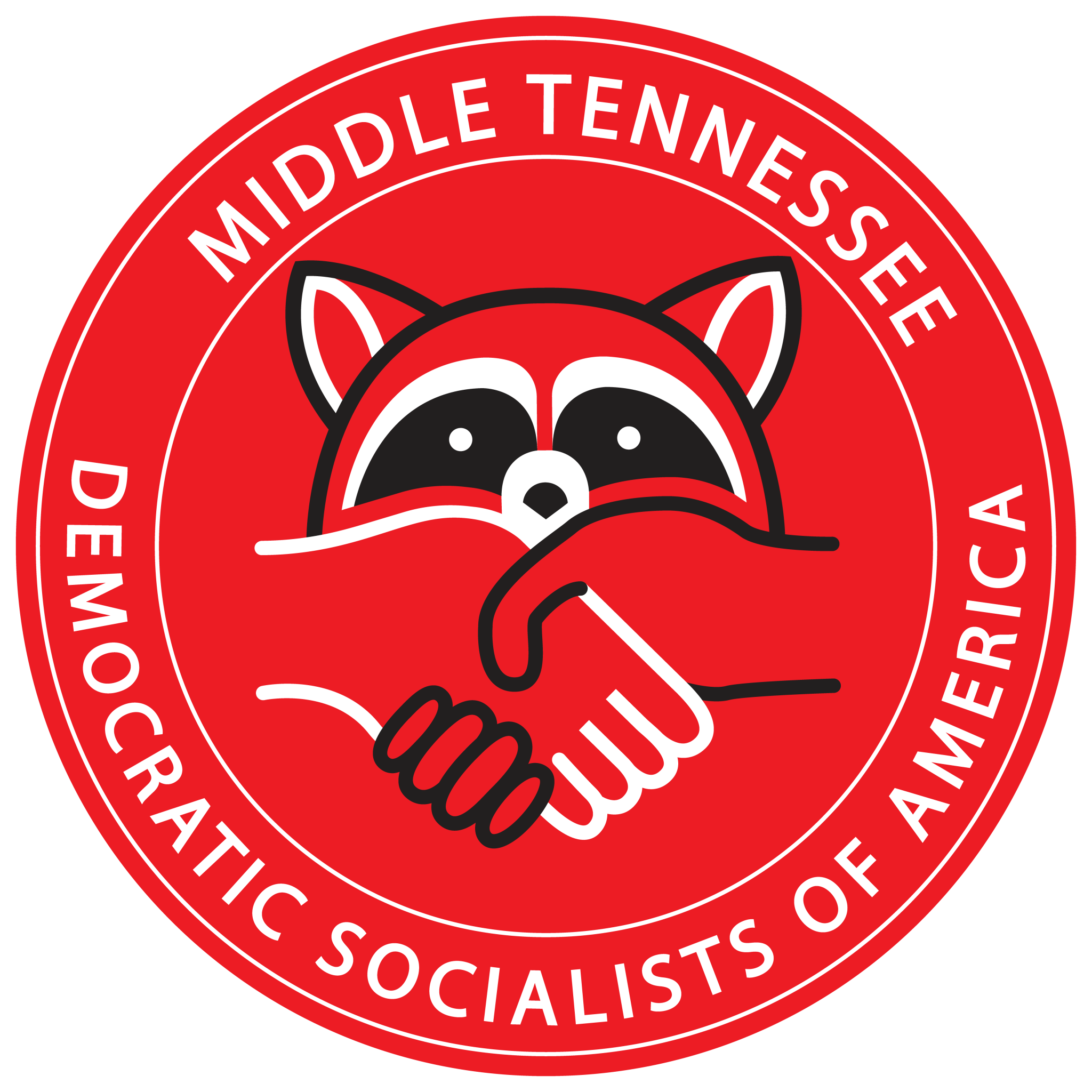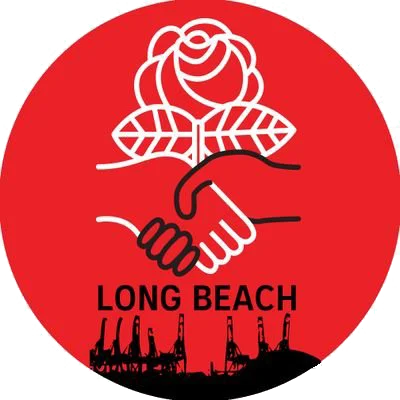

Rabbi Michael Feinberg on multi-faith labor organizing and what he learned from the Catholic left


Charlotte Metro DSA Opposes all 6 North Carolina Constitutional Amendments
The Charlotte Metro Chapter of the Democratic Socialists of America (CLTMDSA) strongly opposes the six NC constitutional amendments slated for the November 2018 ballot. These amendments are unintelligible jargon, unreadable, and ultimately part of a concentrated GOP power grab to gerrymander and take powers away from other elected officials. We urge others in the Charlotte-Metro region to also vote against all six amendments. Read more about them below.
Amendment 1: Photo ID voting requirement
This will require voters to show photo ID before casting a ballot. Defenders of these laws claim that IDs reduce voter fraud; however considering in-person voter fraud is extremely rare, requiring voters to show identification is more of “a solution in search of a problem.” The reality is that these ID laws prevent many from exercising their right to vote and are discriminatory against the poor, racial minorities, and other vulnerable groups.1
Amendment 2: Create an eight-member bipartisan election board
Under current North Carolina law, the election board consists of nine members – four from the governor’s party, four from the other major party, and one independent – with the governor overseeing the board. This amendment will reduce the nine-member election board down to eight, all of which would be appointed by the general assembly thus taking power away from the governor.2 As the current governor is a Democrat, this amendment is simply a blatant power grab by the Republican- controlled legislature.
Amendment 3: Reduce the state income tax cap from 10% to 7%
As Democratic Socialists, we believe that people should pay their fair share and that if you have more, you should pay more in order to create a society that meets the needs of all. This amendment would cap the income tax at 7%, thus concentrating more wealth for the wealthy while putting more financial burden on lower-income earners and potentially cutting funds from needed services.
From the News & Observer: “A state’s revenue needs can vary unpredictably over time and income tax caps eliminate flexibility. If income taxes can’t be raised to meet needs, a state’s primary alternative is to raise sales taxes (and various usage fees). Sales taxes (and usage fees) impact poor people much more than they impact wealthy people: Poor people must spend most of their income, subjecting most of their income to sales tax, while wealthier people spend a much lower percentage of their income. Moreover, [this specific cap] locks in rates that are lower than recent historical rates and the new flat-rate tax structure shifts more of the income tax burden to lower earners. Other states such as Kansas that have lowered tax rates dramatically have had poor results. We are already seeing hints of the impact in N.C. with a precipitous drop in inflation-adjusted per student spending in public schools.”3
Amendment 4: Establish a merit system for filing judicial vacancies
This amendment is another attempted power grab by the NC GOP and shifts the power of who appoints judges between elections from the governor to the state legislature. Instead of the governor making appointments, anyone in the state may submit recommendations to the general assembly who will then provide the names of two NCGA-selected nominees to the governor. The governor will then have to select from between those two nominees who are not subject to gubernatorial veto. If a vacancy occurs right before an election, the chief justice of the N.C. Supreme Court is then tasked with the appointment instead of the governor.4
Amendment 5: Protect the right to hunt, fish, and harvest wildlife
There is no current threat to these activities in the state, and having this on the ballot is more so an attempt to get the GOP base to show up to the polls. Since the amendment refers to making these “preferred means of managing and controlling wildlife,”5 this also causes ecological concerns in that it could result in reduced protections for wildlife areas and habitats. It also defers hunting and fishing laws to the general assembly, which takes power away from local groups to establish regulations and create or maintain protected wildlife areas. Again, this is nothing more than another attempted power grab by the state legislature.
Amendment 6: Add rights for victims of felony crimes
As Democratic Socialists, we stand for the abolishment of prisons and the carceral state. This particular amendment is dangerous as it could result in even more people in prisons and with harsher sentencing. There are also risks that this could create even more bias against defendants facing trial.
Mark Rabil, law professor at Wake Forest University says, “Obviously everybody agrees victims should have rights, but the way I see the goal of Marsy’s Law is so much more than that................. The bottom line is
they’re giving victims and victims’ families constitutional party status that can override the constitutional rights of a defendant to a fair trial and the right of districts attorneys to pursue cases in ways they perceive to be fair.”6
On top of the fact that the criminal justice system already largely discriminates against vulnerable communities and racial minorities, this amendment is an open door to further exacerbate that discrimination and create even more disparity within our justice system.
CLTMDSA sees these amendments as disingenuous and not in the best interest of the people of North Carolina. Rather these efforts are to increase GOP control, consolidate power for the wealthy, and create more inequality for the most vulnerable in the state. Please join us in voting NO on all six in November.
1https://www.aclu.org/other/oppose-voter-id-legislation-fact-sheet 2 https://longleafpolitics.com/nc-constitutional-amendments-2018/
3https://www.newsobserver.com/opinion/op-ed/article214823780.html 4https://longleafpolitics.com/nc-constitutional-amendments-2018/ 5https://www.newsobserver.com/news/politics-government/article216437935.html 6https://www.charlotteobserver.com/news/politics-government/article218118890.html


Charlotte Metro DSA statement on BDS
Charlotte Metro DSA
unequivocally supports Palestinian liberation, unequivocally condemns the State of Israel’s occupation and colonization of all Arab lands, unequivocally supports the fundamental rights of Arab-Palestinian citizens of Israel to full equality,
unequivocally supports the rights of Palestinian refugees to return to their homes and properties,
unequivocally condemns the Israeli sniper massacre of Palestinian protesters and Israeli bombardments of Gaza,
unequivocally calls for the U.S. embassy to be moved back to Tel Aviv,
and unequivocally endorses the Boycott, Divestment, Sanction movement." from 9/9/18


Middle Tennessee DSA Endorses Prison Strike

PER THE RESOLUTION PASSED AT THE JULY 2018 GENERAL MEETING, the Middle Tennessee chapter of Democratic Socialists of America endorses the upcoming National Prison Strike called by incarcerated men and women. This strike, which begins on August 21 and extends through September 9, 2018, is a response to the April 2018 uprising at Lee Correctional Institution in South Carolina, during which seven men lost their lives.
Behind prison walls, individuals encounter brutality and exploitation that can only be understood by those who have shared in the experience. With roughly 5% of the world’s total population but 25% of the world’s total prison population, the United States incarcerates the highest number of people in the world in both absolute and relative terms. Mass incarceration perpetuates modern day slavery, and as socialists, we seek to dismantle this system of exploitation, dehumanization, and subjugation. We see that the true goal of the carceral state is not to rehabilitate or protect, but to deny humanity and further the rancid institution of slavery that undergirds this country in the name of profit.
We know that dehumanization through criminalization, which begins for many at a young age, haunts our neighborhoods and communities by stripping individuals of their autonomy and agency. In Middle Tennessee, we further recognize that gentrification exacerbates this phenomenon; North Nashville, a historically Black community that has been cyclically plundered and neglected by the ruling class of the city since former slaves settled here 150 years ago, and which is once again under assault from both developers and local government, experiences an incarceration rate of 14% — the highest in the nation. People who have lived in our communities for decades are being pushed out in the same way that the colonizers of this continent displaced indigenous tribes who inhabited these lands for generations. As before, those who refuse to move will have the boot of the state pressed on their neck.
Mass incarceration is not an aberration but rather the product of a system created with the express purpose of ensuring that those profiting from the exploitation of society’s most marginalized will continue to do so. This is a system built by the creators of the United States of America and maintained by the forces of both capital and the state. The alliance between capitalism and the state is on full display when CoreCivic, the largest private prison corporation in the world, headquartered in Nashville, pays both its shareholders and sympathetic politicians dividends extracted through the misery of imprisonment. These profiteers are the direct ideological descendants of the architects, benefactors, and overseers of the Atlantic slave trade.
We support the demands of this strike, which are:
- Immediate improvements to the conditions of prisons and prison policies that recognize the humanity of imprisoned men and women.
- An immediate end to prison slavery. All persons imprisoned in any place of detention under United States jurisdiction must be paid the prevailing wage in their state or territory for their labor.
- The Prison Litigation Reform Act must be rescinded, allowing imprisoned humans a proper channel to address grievances and violations of their rights.
- The Truth in Sentencing Act and the Sentencing Reform Act must be rescinded so that imprisoned humans have a possibility of rehabilitation and parole. No human shall be sentenced to Death by Incarceration or serve any sentence without the possibility of parole.
- An immediate end to the racial overcharging, over-sentencing, and parole denials of Black and brown humans. Black humans shall no longer be denied parole because the victim of the crime was white, which is a particular problem in southern states.
- An immediate end to racist gang enhancement laws targeting Black and brown humans.
- No imprisoned human shall be denied access to rehabilitation programs at their place of detention because of their label as a violent offender.
- State prisons must be funded specifically to offer more rehabilitation services.
- Pell grants must be reinstated in all US states and territories.
- The voting rights of all confined citizens serving prison sentences, pretrial detainees, and so-called “ex-felons” must be counted. Representation is demanded. All voices count.
We call for solidarity between those of us whose only chains are wage labor and the incarcerated individuals who will begin striking on August 21. Through solidarity we will support those caught in the snare of the prison industrial complex until and after they are free. Through solidarity we will break down the walls that the racist, classist, sexist bourgeoisie erected to separate us. Through solidarity alone will we create a future for all of us that exists without chains or bars.


Middle Tennessee chapter of the Democratic Socialists of America endorses “No” vote on the upcoming Nashville Transit proposal.
The Middle Tennessee chapter of the Democratic Socialists of America encourages people to vote “No” on the upcoming Nashville Transit proposal.
Our chapter has voted by the slight majority of 52% to present a unified front opposed to the measure While on principle the chapter is strongly in favor of increased public transit, climate conscious governance, and an increase in union-backed jobs, this plan does not directly or equitably serve the citizens of Nashville that depend on transit the most.
Nashville faces not only a transit crisis, but also a crisis of gentrification and displacement on a monumental scale. Concrete issues such as transit deserts, rising housing costs, dependence on exploitative ridesharing services such as Lyft and Uber, and poor bus coverage all need to be addressed head-on by local government. The unfortunate fact that this transit plan lacks a community benefits agreement addressing any of these issues eliminates the possibility of a principled socialist endorsement.
Our chapter has publicly supported a local working class coalition called the People’s Alliance for Transit, Housing, and Employment (PATHE). We stand in solidarity with their demands which include 31,000 affordable homes by 2025, 24/7 bus service with expanded routes into transit deserts, and guaranteed living wage construction jobs.
Dirty money is heavily involved on both sides of the issue, with reactionary Koch-backed groups fighting the plan and reprehensible actors such as CoreCivic supporting its passage. We seek to distance ourselves from all corrupt interests and focus on the concrete, material impact this particular plan will have on our communities.
While any group that supports the general welfare of the people in Nashville should advocate for increased transit access, this plan serves only to maintain the status quo and accelerate the destructive forces of capitalist development in the area. We urge our members and supporters to vote against the Transit plan on May 1st and to join other working class efforts to create a better, equitable future for Nashville’s transit. This fight does not end when the ballot box closes


List of Committees
The list of current DSA Long Beach committees. The purposes of each will be added in the future.
The post List of Committees appeared first on DSA-LB.


Julien Baker is a queer, Christian, socialist — we had to talk to her


"If religion doesn't allow us to build bridges, it becomes a drug" —Rev. Juan Carlos Ruiz


Letter to Long Beach City Council on “8 by 28” Olympic Development Initiative
February 6, 2018 Members of the Long Beach City Council Mayor of the City of Long Beach 333 W Ocean Blvd Long Beach, CA 90802 Dear Mayor Garcia... Read more »
The post Letter to Long Beach City Council on “8 by 28” Olympic Development Initiative appeared first on DSA-LB.

